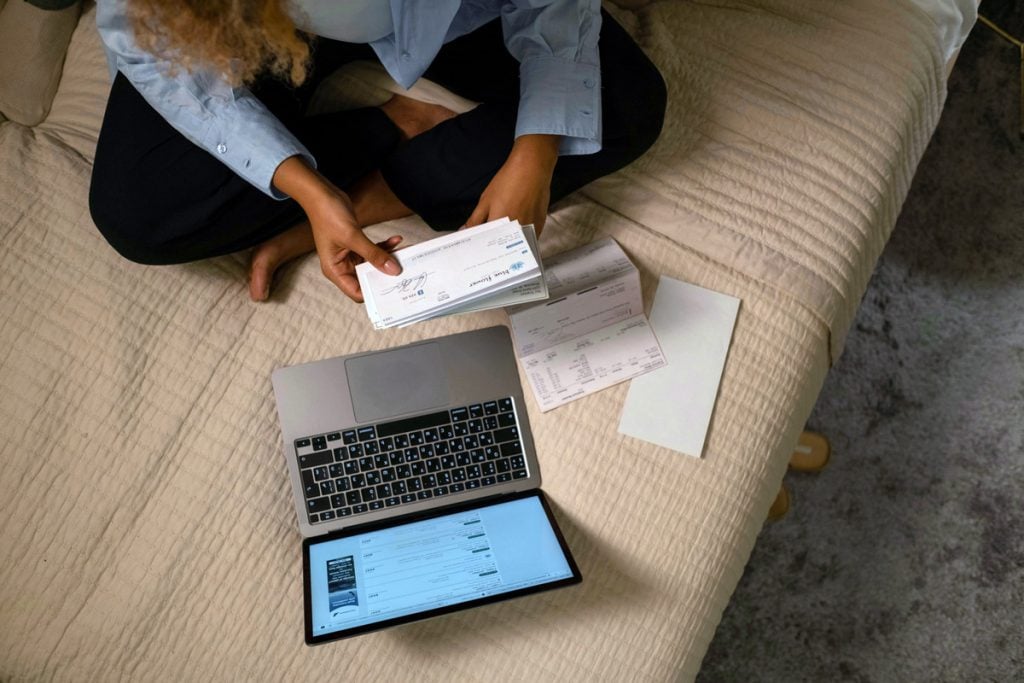Should You Focus on Paying Off Debt or Investing?

You’ve probably heard that investing and growing your money is one of the smartest financial moves you can make. But what if you have a lot of debt. Isn’t it better to focus on that? Paying down debt is never a bad idea. However, in some cases, it may make more financial sense to invest that money instead. But how do you know when to prioritize one over the other? Well, it all depends on your debt, investment options, time horizon and how much risk you’re comfortable taking on. Here’s how to decide whether you should pay off debt or invest — or do a mix of both.
Should You Pay Off Debt Or Invest?
When you pay off debt, every dollar you put toward your balance removes a liability and saves you money on interest. It’s basically a guaranteed return equal to the interest rate on that debt. For example, if your credit card charges 20% APR, paying it off is like earning a 20% risk-free return. No stock or bond can consistently match that kind of guaranteed payoff.
When you invest, your money also goes to work for you, but in a different way. Every extra dollar you put into a mutual fund, index fund or retirement account, you’re banking on growth. Though not guaranteed, that growth can compound and grow exponentially over time. And the earlier you start investing, the more you’d be able to benefit from compound interest.
The simplest way to decide whether to pay off debt or invest is by comparing the rate of return you expect to earn on your investment with the interest rate you’re paying on your debt.
“For example, let’s use the S&P 500 performance as a benchmark and assume the historical return is 10%. If your debt has an interest rate of 5%, I would prioritize investing because your investments will grow at a faster rate than the debt will grow,” explained Kristin Thompson Poelker, certified financial planner at Renaissance Financial. “If your debt has an interest rate of 15% then prioritize the debt because the debt will grow at a faster rate.”
In other words, it really depends on what you think you can make on an investment vs. what you know you can make by paying down a debt.
The Foundation to Build First
Before you pour money into either debt payoff or investing aggressively, make sure you have a solid financial foundation first. Without these basics, you might not even have enough money left over at the end of each month to invest or tackle debt.
Here’s what that foundation looks like.
Making minimum payments on your debts
Even if you decide to focus on investing first, you’ll still want to keep up with minimum payments on all your debts. Missing even one payment can hurt your credit score, trigger late fees and cause your interest rate to spike. Before you invest a single dollar, make sure you’re current on everything you owe.
Having three to six months’ worth of expenses saved
You’ll also want at least three to six months’ worth of living expenses saved in an easily accessible account, ideally a high-yield savings account. With this money set aside, you won’t have to rely on credit cards or pull money from investments when an emergency hits.
Creating a solid budget
If you don’t yet have a budget, create one now so every extra dollar can be intentionally directed toward your goals, whether that’s eliminating debt or building wealth. Using a budgeting app like Cleo, Monarch or Rocket Money can simplify the process.

When to Focus on Debt Payoff
At the end of the day, it’s your money and your call on whether to pay off debt or invest. But if you want to make the best financial decision for your future, these are the situations where tackling debt first typically pays off most.
You’re drowning in high-interest debt
Let’s say you have a $5,000 balance on a credit card with a 22% APR and a minimum payment of around $142. If you only make minimum payments, it’ll take you nearly five years to pay off that debt and cost you over $3,000 in interest charges. Unless you can earn higher returns by investing that money, it generally makes more financial sense to pay down your high-interest debt first.
If this applies to you, there are several ways you can get this paid off sooner rather than later. A balance transfer credit card is a solid option. It can save you money on interest charges by letting you transfer the balance of a card with a high-interest rate to a card with a 0% APR period. So you can focus on paying down the debt without worrying about interest charges.
You can also consolidate your debt with a personal loan to save on interest and make managing payments easier. Just use the personal loan to pay off your debts then focus on paying back the one loan, ideally at a lower interest rate. Online marketplaces like AmONE can match you with a low-interest loan you can use to pay off your balances.
If you’re experiencing unexpected financial instability, like job loss or a medical emergency, debt settlement could be an option. This is when you negotiate with your creditors to try to reduce what you owe. Although you can do this on your own, many people seek the help of debt settlement companies like National Debt Relief and Freedom Debt Relief. This comes with risks though, like lowering your credit score.
You’re stressed about debt
Debt is emotional. According to research from Empower, a financial services company, 36% of Americans report losing sleep over their financial worries. If your monthly payments are overwhelming and affecting your sleep quality, focus on paying down that debt first to lift the weight off your shoulders.
Your income is unpredictable
If you’re self-employed, freelancing or working in a commission-based role, your income might vary from month to month. In that case, lowering fixed expenses like debt payments can make your life a lot less stressful. When you don’t have debt, you’ll have much more flexibility if your income ever dips.
You’re nearing a major life change
Another scenario where it makes sense to prioritize debt repayment is if you’re making a major life change soon, like starting a family, buying a home or retiring within the next few years. Carrying less debt can make those transitions smoother, especially if you anticipate living on a smaller or less stable income.

When to Focus On Investing
Sometimes, investing might actually offer a better long-term payoff than accelerating debt payments. If you’re still not sure whether to pay off debt or invest, here’s when it makes sense to invest.
You have low-interest debt
Not all debt is bad. A 3% mortgage or a 4% federal student loan is relatively cheap money, especially when you compare them to the historical average stock market return of around 7% to 10% annually. In other words, when you have low-interest debt, investing your extra cash could give you a better long-term return than paying the loan off early.
You have a long time horizon
The longer your money stays invested, the more it benefits from compound growth. If you don’t plan on retiring for a few decades, the time advantage you have is huge. For example, if you invest $200 a month with an average 7% annual return, it could grow to over $240,000 in 30 years. Paying off a 4% loan early wouldn’t match that growth potential.
You’re financially stable and comfortable with debt
If you have a stable job, a good emergency fund and a clear handle on your finances, it’s OK to carry manageable low-interest debt while investing aggressively. For example, even though many homeowners have 15- or 30-year mortgages, they’re still able to allocate extra cash toward investing for retirement.
Once your emergency fund and minimum debt payments are set, it’s up to you what you want to do with your money. If interest on your debt is manageable and you’re confident in your budget and your ability to stick with your plan, investing early can accelerate your path to financial independence.
Can You Do Both?
Absolutely. As long as you do it with intention. Eric Croak, certified financial planner and president at Croak Capital, suggests making the minimum payments on your low-interest debt while putting any extra money toward your high-interest balances first. Once those are under control, you can start investing the rest. “This approach offers flexibility without putting all your proverbial eggs in one basket or another. It’s a way to divide your paycheck into the past (debt) and the future (investments), giving both the attention they deserve without cannibalizing the other.”
Here’s how that might look in practice:
- Pay all your minimum balances first: Before you do anything else, make sure you’re covering at least the minimum payments on all your debts each month. This way, you’ll prevent expensive late fees and keep interest from piling up faster than you can pay it down.
- Pay down high-interest debt next. Once you’re making all your minimum payments, focus on tackling high-interest balances, such as credit card or personal loan balances. These typically charge 15%, 20% and sometimes even more.
- Invest. Besides paying down your debts, you’ll also want to allocate a set amount into a retirement account or index fund every month.
- Revisit your plan every few months. As your income, expenses or debt levels change, adjust your allocations. Depending on your situation, you may want to invest more aggressively after paying down certain loans. You could also temporarily put more toward debt repayments if rates go up.












